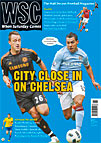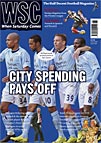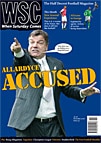Search: ' Ken Davy'
Stories
 Arsenal assistant manager Pat Rice is a beacon of hope to sufferers of a rare and misunderstood social affliction, writes Damian Hall
Arsenal assistant manager Pat Rice is a beacon of hope to sufferers of a rare and misunderstood social affliction, writes Damian Hall
Some Arsenal fans want assistant manager Pat Rice to retire or even step aside. The idea is that the former Gunners captain will be replaced with some hitherto unidentified tactical genius and “no” man who’ll push the club on to grab some silverware more prestigious than the Emirates Cup. Which we’ve won in three of the last four years, by the way. Pat (I can call him that because we’re mates – you’ll see) is seen as something of a “yes” man to Arsène Wenger and the feeling is that perhaps Le Prof’s philosophy needs tweaking here and there. Such as, try shooting. But I don’t want Pat to leave. Not now. Not ever.
You see, we shared a common affliction. On a mild September afternoon in 2000 I had what can only be described as an epiphany. Dennis Bergkamp had turned the ball towards the Coventry goal, only for an airborne Magnus Hedman to halt its path. “That was his third great chance,” I bellowed from my seat behind the goal. “Bergkamp really should have scored by now!” People were turning to stare my way, with bemused looks in their eyes and we-know-better, sympathetic smiles. I was smirkingly informed that Bergkamp was in fact Freddie Ljungberg. I badly needed spectacles.
Of course, it’s obvious now that I should have taken more time to think about it. But when the optician – who you would hope to be a morally responsible person – suggested spectacles with an in-built automatic tinting system that would be good for driving and stop me having to buy prescription shades too, it sounded like a very good idea indeed. Safe, economical and with a hint of secret spy gadgetry about it.
The thing was, I had bought a pair of frustrated shades. They could, and would, turn black with a pinprick of light – on the underground, in the pub and any time I ventured near a street lamp.
To the outside world I had become a permanent shades wearer, slipping seamlessly into the same bracket as teenage wannabe rock stars and people who think they’re famous because they’ve appeared on Kilroy. I was oblivious to when the glasses were tinting and had to rely on friends to point it out. Which they did reliably. It wasn’t all bad, admittedly. I could see things a bit better. I realised, disappointingly, that David Seaman wasn’t actually wearing a Davy Crockett hat and that someone called Gilles Grimandi had been playing for Arsenal for the last few years entirely without my knowledge. Yet these life enhancements seemed scant consolation. It got worse.
My nadir came on a cold February afternoon as I watched a Conference match at Forest Green’s inappropriately named ground, The Lawn. At just after four it was getting dark. As the floodlights came out to play, my dependably disobedient spectacles did their party piece. I was used to it by then and was oblivious anyway. But the Sky cameras just happened to be there and had, with horrible coincidence, chosen that moment for a close up of yours truly. Wearing shades. In the dark.
Not your average close-up either. The producer, or whoever decides these things, evidently found something worthy of public interest in my appearance and let the camera linger a while. There was nothing much happening on the pitch after all, just a frantic relegation dogfight. And a while more. Long enough for an absent so-called friend, battling back the tears of laughter, to reach for the VCR record button just in time. There’s no two ways about it, I looked a prize pillock. And my moment of fame is on videotape for posterity.
But then, at my lowest point, an angel came to me, albeit an angel in a tracksuit. I had always imagined that I was utterly, bitterly and desperately alone with my miserable social handicap. But I discovered I wasn’t the sole sufferer of spectacle folly. Sitting on the Arsenal bench, without a care in the world, though tucked under a blanket looking disturbingly like a grandmother about to reach for the Thermos at this time of year, was someone with the very same pair. Assistant manager and Arsenal legend Pat Rice. My new hero.
Pat sits there so defiantly unselfconscious as his specs change from transparent to dark and back again by the minute (as, for example, a light-obstructing substitute jogs past). Regardless of what life has dealt him, he just gets on with it, as if he’s as normal as the next man. Saint Pat’s not ashamed or embarrassed, he’s just comfortable with who he is. He is the Rik Waller of football. He is a role model, a beacon of light in dark depressing days, who gives strength and courage to bad spectacle sufferers the world over. Gawd bless him.
I just wanted to say, thank you Pat. You gave me hope when all else was lost. And for this reason he must stay in the public spotlight, to others who’ve made the same dreadful and desperate mistake.
From WSC 295 September 2011
 Several football grounds now double up as venues for professional rugby. Roger Titford suggests that competition from another sport is becoming a problem for clubs that are already struggling
Several football grounds now double up as venues for professional rugby. Roger Titford suggests that competition from another sport is becoming a problem for clubs that are already struggling
Once upon a time, about 130 years ago, football and rugby sat happily enough alongside each other as almost alternative flavours of the same basic sport. Then came professionalism, division, social change and a century or so of estrangement, with each finding security in its own territory. Times are changing again.
 On the 25th anniversary of the start of the national miners’ strike, Jon Spurling looks at the industry’s long-established links with professional football that have since been swept away
On the 25th anniversary of the start of the national miners’ strike, Jon Spurling looks at the industry’s long-established links with professional football that have since been swept away
Twenty-five years ago football and coal mining had in common the fact that Margaret Thatcher clearly didn’t see a long-term future for either within British society. In 1985, a Socialist Worker article drew parallels between the 1984 “Battle of Orgreave”, where around 10,000 pickets squared up to as many police, with the violence at Kenilworth Road during a Luton v Millwall FA Cup tie in 1985: “The images of violence and of raging anger (although those witless football fans have no cause at all) lead us to question whether the fabric of society is close to collapse in Thatcher’s Britain.” Two years after the strike ended, at a time when the minister for sport Colin Moynihan mooted the idea of a compulsory membership scheme to curb hooliganism, a letter to the Guardian expressed a fear that “a high handed government, with sheer contempt for the working classes, is, if one looks at recent events, attempting to utterly destroy two bastions of working class Britain.” To take the comparison to its conclusion, both industries had been irrevocably altered by the late 1980s. In the wake of the Taylor Report into the Hillsborough disaster, and Italia 90, football would become gentrified, and machines replaced workers as colliery closures continued apace. “The working class’s links with both football and mining were, directly or indirectly, rightly or wrongly, severed by Thatcher’s government,” remarked former Labour MP Roy Hattersley in 1992.
 Dan Herd explains that although he saved them from administration, chairman Ken Davy is not flavour of the month among Town fans
Dan Herd explains that although he saved them from administration, chairman Ken Davy is not flavour of the month among Town fans
When around 100 Huddersfield Town fans gathered outside the Galpharm stadium to protest about chairman Ken Davy’s lack of investment in the team after the 3-2 home defeat by Yeovil on September 16, many outside observers were confused. After all, this is the man who, in July 2003, had taken the club out of administration, thus saving the Terriers from extinction. Since the takeover, Huddersfield Town have gone from League Two to the League One play-offs in three seasons – so what is there to protest about?